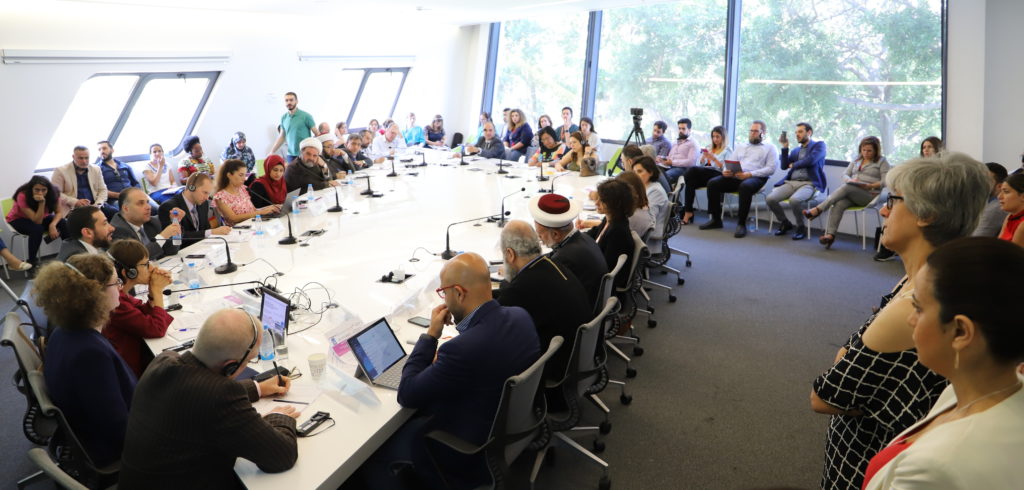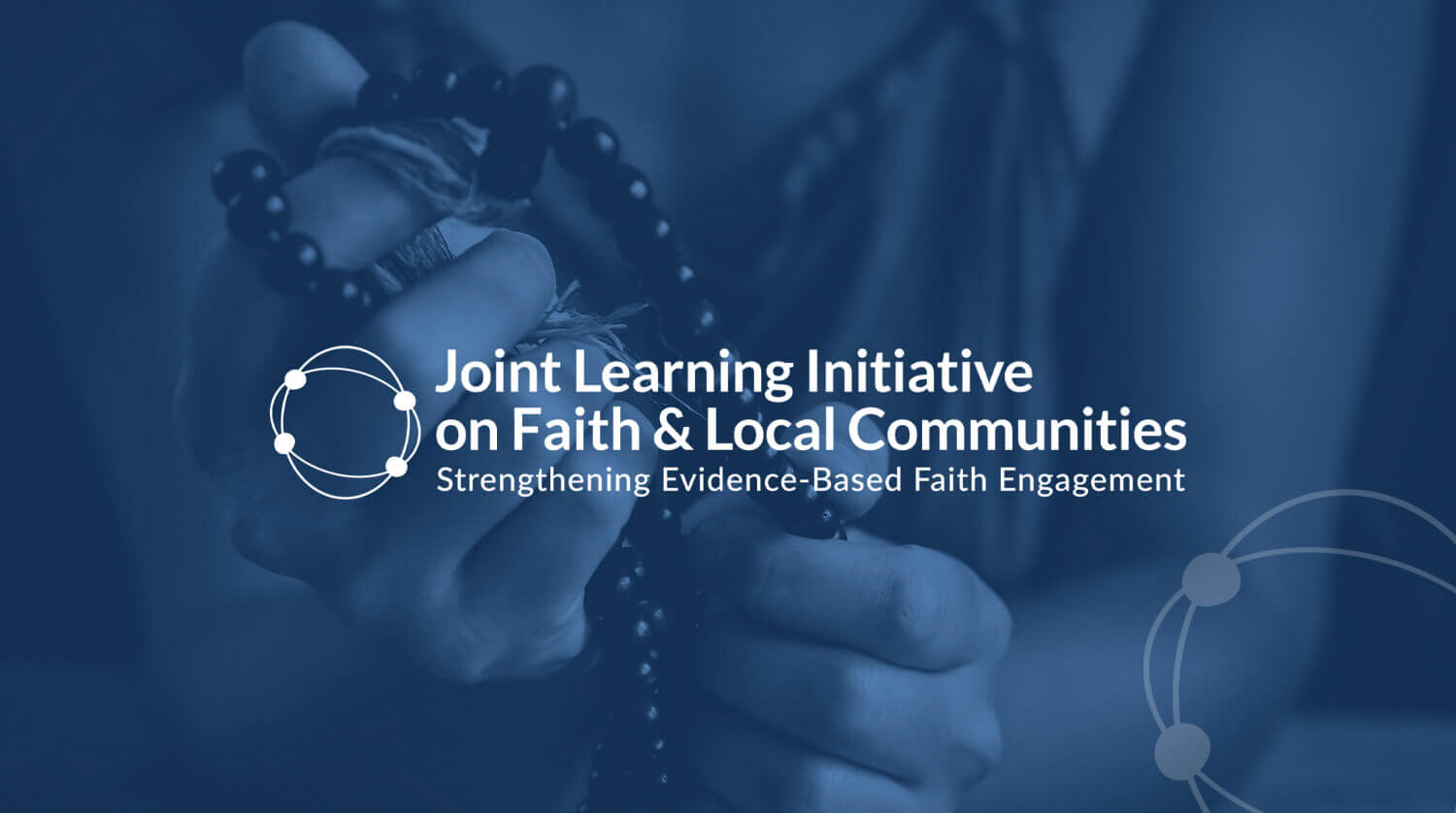BEIRUT, LEBANON:
Leading members from Lebanon’s diverse network of religious institutions came together on Tuesday to stress the crucial role that faith plays in responding to the refugee crisis and to urge for faith to be better integrated into the mainstream refugee response.
Representatives from UNHCR and the Ministry of Social Affairs, Christian, Sunni and Shia faith leaders, as well as aid groups with and without religious foundations all stressed how faith should play a pivotal role in reducing the strain of displacement and war and be used as a tool to better integrate arrivals into host communities, as well as in preventing conflict in the first place.
The Role of Local Faith Actors in Implementing the Global Compact on Refugees event was co-hosted by the Joint Learning Initiative on Faith and Local Communities (JLI), World Vision, Islamic Relief Worldwide, Kaiciid Dialogue Centre, the Middle East Council of Churches and ACT Alliance. Dozens of faith representatives, leaders from faith-based and secular humanitarian agencies as well as multiple UN agencies and government representatives all attended the consultation at AUB’s Issam Fares Institute.

pc: World Vision Lebanon
UNHCR’s Representative in Lebanon Mireille Girard said: “At a time of unprecedented displacement across the world, there is a growing consensus that we need to work together towards more effective responses. The Global Compact for Refugees recognises that we need to do better. We all have a role to play and need to mobilise everyone.
“Faith-based organisations are relevant throughout this cycle of displacement – from arrival, to eventual return. Faith-based organisations have a sound knowledge of the context and have a lot of experience in relief support. They also have a role to play in conflict prevention and reconciliation where they can be especially relevant.
“With economic crises and unemployment prevailing in many parts of the world, refugees are increasingly being stigmatised and seen as the reason for these economic crises. These sentiments are widespread so we have to ask ourselves what we can do together to address this phenomenon.”
Robin Sghbini, the Minister of Social Affairs representative and the Head of the Resettlement Response Plan in Lebanon, stressed that religious leaders have an important role to play because they exert great influence in their local communities.
“Their role is not only to ease tensions between the displaced and the host communities, but to reach cooperation in order to resolve other societal issues affecting the refugee community,” he said. “In the past the ministry of social affairs has cooperated with many religious leaders to protect children and women from early marriage and other social and humanitarian issues that protect and support refugees in Lebanon.”
Sghbini also welcomed the idea of partnership between religious leaders and other institutions concerned with the protection of refugee rights because “the crisis of displacement has reached its maximum and we need to join all our efforts”.
Professor Elena Fiddian-Qasmiyeh, Academic Chair of the JLI’s Refugee and Forced Migration Hub, Professor of Migration and Refugee Studies and Co-Director, UCL-Migration Research Unit University College London, said:
“When a person is forced to leave their home and their country in search of refuge and international protection, they are uprooted from their relatives, communities and lives. Often, they will see loved ones killed or injured and face immense barriers as they seek safety. The distress that these experiences and barriers cause is profound, often leaving people struggling to cope in their new surroundings.
“In times like these, faith is one of the only things that many people have left. Yet all too often even this is restricted as people lose access to religious support when they are displaced. What we have seen around the world, though, is that faith can be a key tool in helping people to recover and pursue their quest for protection and social justice. We have also seen that, when harnessed effectively, faith can bring communities together and help prevent future conflict.
“The international community has already recognised the role of faith actors in the Global Compact on Refugees, but it is up to us to ensure that displaced people are able to seek, and be granted, protection, to translate these noble words and intentions into concrete actions.”
The Global Compact for Refugees (GCR), agreed by the world at the end of 2018, acknowledges the role faith actors play in helping refugees and host communities all over the world, but the compact is non-binding.
To truly maximise the impact that faith actors in global refugee response Prof. Elena Fiddian-Qasmiyeh said that the research that has been conducted by the JLI Refugees and Forced Migration Hub shows that:
-
Humanitarian actors and other institutions need to recognise faith actors in all aspects of refugee response and ensure that faith actors are able to meaningfully take part and share responsibility.
-
International actors should expand engagement with faith actors, especially local faith actors in refugee response, with donor agencies stepping up support to build the capacity and compliance of those on the ground.
-
Financial barriers that exclude and discriminate against faith-based organisations need to be removed and donors must support faith actors that provide key services in support of refugees and members of host communities.
-
Access to spiritual support must be available to displaced people alongside psycho-social and humanitarian support.
-
Faith leaders need to be recognised for the role they can and do play in promoting Gender Justice, often countering – not advocating for – issues like FGM and child marriage.
-
Inter- and multi-faith initiatives should be supported to aid integration in host countries and help reconciliation upon return.
Many speakers were careful to stress that they felt xenophobia, racism and Islamophobia, in particular, were all on the rise, across the world but also across the Middle East.
Ziad el Sayegh, Policies and Communication Advisor, Middle East Council of Churches:
“The Global Compact for Migrants and Refugees is built on the obligation to respect human dignity and peace in society and to implement justice; these are fundamental values in all religions.
“It is absolutely impossible for religious authorities not to make the choice of promoting hope and moving people away from xenophobia, especially when accompanying the migration and refugee crises.
“It is impossible to solve the political and security crises through a mere economic and social approach. Solutions should be inspired by the religious fundamentals of human dignity, going back to the roots of ethical bases. This is the role of religious authorities when it comes to converging with the content of the Global Compact for Migrants and Refugees.”
Sheikh Hassan Dalli, of Lebanese organization Iftaa House, and the Mufti of Hasbaya and Marjeeyoun, meanwhile stressed that the Syrian conflict forced many to flee due to internal Syrian matters, but that it was important for all to be concerned for the safety and wellbeing of those who had fled seeking a safer place for their family and children.
“This was our humanitarian duty to receive the Syrian refugees in Lebanon as many countries did and to provide what is necessary to preserve their lives,” he said. “Similar circumstances have happened throughout history during wars and its hardships.”
This event is made possible by support from the Henry Luce Foundation
For more information or to arrange an interview please contact: [email protected]
To find out more about how faith actors can help deliver on the Global Compact please read the Joint Learning Initiative Refugee Hub’s policy brief.
اقرأ الخبر الصحفي هنا بالعربي






